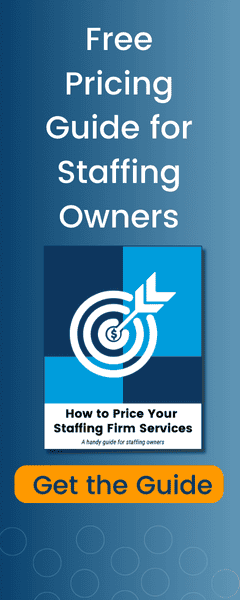4 Tax Tips for Staffing Companies

Last time updated: December 17, 2024

Ah, tax season. The time of year where if you listen closely, you can practically hear the yawns of overworked accountants echoing through cubicles all over the country. For staffing firms, tax season can be a headache if you haven’t kept good records or taken the proper steps to ensure your paper work is in order. Below, we have listed some staffing industry-specific tax advice taken from our more in depth Staffing Industry Guide to Taxes, a resource with links to important forms and other pertinent tax information.
1. UNDERSTAND HOW TO CLASSIFY YOUR EMPLOYEES
Are you working with employees, independent contractors, or both? Although it may be tempting to label your employees as independent contractors because of tax savings, you need to consider carefully if they should be classified as W-2s instead. Be careful – organizations face steep interest payments, fines or even criminal punishments when they improperly classify a worker. Read the IRS rules classifying Independent Contractors vs Employees
2. TAKE ADVANTAGE OF TAX CREDITS
If applicable, take advantage of the Work Opportunity Tax Credit (WOTC), a federal tax credit rewarding companies for employing individuals who have previously faced significant barriers to employment such as veterans, long term unemployed, and food stamp recipients. Employers can earn up to $9,600 in federal tax credits for each qualified employee, and there is a good chance you may already be hiring individuals from these target groups but not claiming the tax credits. To apply for these tax credits, employers are required to fill out several forms and submit them within 28 days of the new hire to be eligible for the tax credits.
3. AVOID COMMON PAYROLL TAX PITFALLS
Many staffing firms face common pitfalls when it comes to payroll taxes. Keep these in mind to avoid IRS scrutiny and bad consequences for your business.
- Not documenting and responding to notices – if you see a notice from the IRS, don’t pretend it’s junk mail. Small businesses historically are the largest source of uncollected taxes, so tax notices could come at any time and not responding could put your business at risk.
- Misclassifying employees – see #1 above.
- Borrowing funds and making late deposits – when a cash crisis occurs, pulling money from employee paychecks may seem like a good short-term solution, but be wary. You have to ensure you have the resources available to pay your payroll taxes on time.
- Not understanding the basics – Did you know that you are supposed to file unemployment taxes in the state where the work was performed, not the state where the worker lives? Or that some states require employers to file both payroll taxes and income tax returns? If you aren’t familiar with the payroll tax basics, it is important that you work with a company that does in order to avoid harsh penalties.
4. KEEP RECORDS LIKE CRAZY
Should the IRS ever question your payroll or business, these records must be kept for examination. Make sure that you have:
- The names, addresses and Social Security numbers for every employee
- The period of employment and compensation for each employee
- The total amounts of pay given to each employee
- The amounts of each payment kept as taxable wages
- Complete copies of each employee’s W-4 form
- All dates and records for each tax deposit made by your company
- Thorough copies of all tax returns filed
- Any and all W-2 forms that were undeliverable to past employees
CONCLUSION
Tax season can be a hassle, but with the right information and resources, the headaches can be mitigated. If your staffing firm is struggling to keep up with taxes, Advance Partners can help. Unlike funding only firms, we have an in-house back office team of tax experts that help our clients file taxes on time and maximize returns every year. Contact us today to see if we can help you with your taxes or other administrative burdens.
Learn more about our staffing and recruitment payroll tax services and solutions.
Up Next















